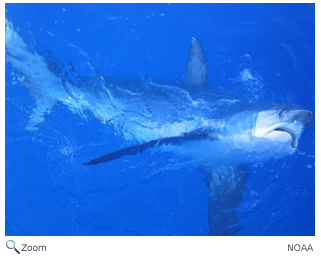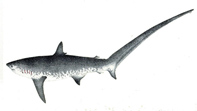 There are three species in this family of sharks. They are found in temperate and tropical regions of all the world's oceans and range in size from 10-24 feet. There are three species in this family of sharks. They are found in temperate and tropical regions of all the world's oceans and range in size from 10-24 feet.
Thresher sharks are easily identified by their extremely long and curving upper caudal fin. It is often as long as the shark's body! Thresher sharks have short heads, cone-shaped snouts, and small mouths. They have long, pointed pectoral fins; two spineless dorsal fins; and five pairs of gill slits.
The sharks in this family eat bony fish and squid. They use their tails to stun their prey. They have even been know to stun seagulls with their tails!
Species in this family include: the
pelagic thresher shark, the
bigeye thresher shark, and the
common thresher shark.
World Status Key
 Least Concern Least Concern  Near Threatened Near Threatened  Vulnerable Vulnerable  Endangered Endangered  Critically Endangered Critically Endangered  Extinct in Wild Extinct in Wild  Extinct Extinct  Not Enough Data Not Enough Data
Status and range is taken from ICUN Redlist.
U.S. Status Key
 Threatened in US Threatened in US  Endangered in US Endangered in US  Introduced Status taken from US Fish and Wildlife. Click on U.S. status icon to go to the U.S. Fish and Wildlife species profile. Introduced Status taken from US Fish and Wildlife. Click on U.S. status icon to go to the U.S. Fish and Wildlife species profile.
New Hampshire Status Key
 Threatened in NH Threatened in NH  Endangered in NH Status taken from NH Fish and Game Endangered in NH Status taken from NH Fish and Game
Location Key
 Arctic Arctic  Atlantic Atlantic  Indian Indian  Mediterranean/Black Sea Mediterranean/Black Sea  Pacific Pacific  NH NH  Click for More Info Click for More Info  Click for Image Click for Image
Resource Key
 Profile Profile  Photos Photos  Video Video  Audio Audio
New Hampshire Species
Common Thresher - Alopias vulpinus        
North/Central American Species
Pelagic Thresher - Alopias pelagicus     
Bigeye Thresher - Alopias superciliosus      
Other Species Around the World
Additional Information
Bigeye Thresher Shark - Alopias superciliosus      
In the U.S., the bigeye thresher is found from the coast of New York to Florida and from the California coast to the Gulf of California and south of the Hawaiian Islands.
Source: Florida Museum of Natural History Intended Audience: General Reading Level: Middle School
Bigeye Thresher Shark - Alopias superciliosus      
The bigeye thresher shark has eyes are in keyhole-shaped sockets that allow them to be rotated upward. This allows the bigeye thresher to locate prey that is swimming above it.
Source: ReefQuest Centre for Shark Research Intended Audience: General Reading Level: Middle School
Bigeye Thresher Shark - Alopias superciliosus      
The bigeye thresher uses its long tail to herd fish and then stun them.
Source: EDGE Intended Audience: General Reading Level: Middle School
Common Thresher Shark - Alopias vulpinus        
The common thresher shark can live to be 45 to 50 years old.
Source: Animal Diversity Web Intended Audience: General Reading Level: Middle School
Common Thresher Shark - Alopias vulpinus        
The common thresher shark can grow to 20 feet in length.
Source: NOAA Fisheries Intended Audience: General Reading Level: Middle School
Common Thresher Shark - Alopias vulpinus        
The common thresher shark's caudal fin is sickle-shaped and it's upper lobe is extremely long. It makes up about 50% of the total body length of the thresher shark.
Source: NOAA FishWatch Intended Audience: General Reading Level: Middle School
Common Thresher Shark - Alopias vulpinus        
The common thresher shark is also known as the fox shark, sea fox, swiveltail, and thrasher.
Source: Florida Museum of Natural History Intended Audience: General Reading Level: Middle School
Common Thresher Shark - Alopias vulpinus        
The common thresher shark preys mostly on small schooling fishes, including mackerels, bluefishes, herrings and sardines.
Source: ReefQuest Centre for Shark Research Intended Audience: General Reading Level: Middle School
Pelagic Thresher Shark - Alopias pelagicus      
The pelagic thresher has been known to leap out of the water.
Source: EDGE Intended Audience: General Reading Level: Middle School
Pelagic Thresher Shark - Alopias pelagicus      
The pelagic thresher shark is found in warm and temperate offshore waters of the Pacific and Indian oceans, including the Mediterranean Sea.
Source: Florida Museum of Natural History Intended Audience: General Reading Level: Middle School
Pelagic Thresher Shark - Alopias pelagicus      
The pelagic thresher shark reaches lengths of up to ten feet. It is the smallest of the pelagic sharks.
Source: ReefQuest Centre for Shark Research Intended Audience: General Reading Level: Middle School
|


